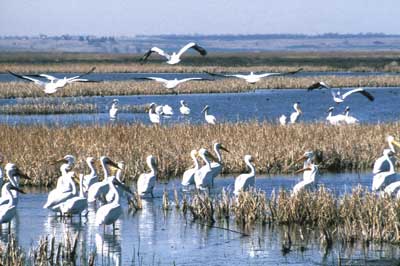A Place to Visit
Cheyenne Bottoms
![]()
Barton County,
Kansas

Cheyenne Bottoms contains the largest system of wetlands in Kansas.
Covering 64 square miles and lying northeast of Great Bend in Barton
County, this natural basin is fringed on the north, south, and west
by low sandstone bluffs. The large pools of water and mudflat shallows
are alive with foraging birds during the seasonal migrations, when hundreds
of thousands of shorebirds, wading birds, and waterfowl stop to rest
and feed. Most of Cheyenne Bottoms has been preserved for wildlife;
nearly 30 square miles is a wildlife management area maintained by the
Kansas Department of Wildlife and Parks (KDWP), and over 11 square miles
is owned and managed by The Nature Conservancy.
Cheyenne Bottoms is the top shorebird staging area during migration
in the 48 contiguous states, attracting almost half of the North American
shorebirds with migration paths east of the Rocky Mountains. Some 320
species of birds frequent Cheyenne Bottoms, including the endangered
whooping crane, peregrine falcon, least tern, and piping plover. The
peak migration time is late March through late May. Autumn is also a
good time to see migrating birds, especially ducks and geese.
To get to KDWP headquarters at Cheyenne Bottoms from Great Bend, drive 6 miles north on U.S. Highway 281 from its junction with U.S. Highway 56, then east 2 miles. The Nature Conservancy has a driving tour of their preserve that starts 8 miles north of Great Bend on U.S. Highway 281. Turn east on NE 80 Road and begin the tour at the kiosk. This route takes you past the KDWP headquarters and back to U.S. Highway 281, 2 miles south of where you started. Photo by Gerald W. Tomanek.

Kansas Geological Survey
1930 Constant Avenue, Campus West
Lawrence, Kansas
66047-3726
(785) 864-3965
-
Tom Collinson, Chair, Pittsburg
-
Robert Crangle, Lincoln
-
Dyan Jones, Prairie Village
-
Sheila Leiker-Page, Victoria
-
Jeffrey Mason, Goodland
-
Dennis McKinney, Greensburg
-
Stephen Morris, Hugoton
-
Larry J. Richardson, Wichita
-
John K. Strickler, Manhattan
-
William Hambleton, Emeritus Member, Lawrence
-
A. Scott Ritchie, KU Geology Assoc. Rep., Wichita
Director: Lee Allison
The mission of the Kansas Geological Survey, operated by the University of Kansas in connection with its research and service program, is to conduct geological studies and research and to collect, correlate, preserve, and disseminate information leading to a better understanding of the geology of Kansas, with special emphasis on natural resources of economic value, water quality and quantity, and geologic hazards.
The Geology Extension program furthers the mission of the KGS by developing materials, projects, and services that communicate information about the geology of Kansas, the state's earth resources, and the products of the Kansas Geological Survey to the people of the state.
Online February 10, 2003
Comments to: lbrosius@kgs.ku.edu
Kansas Geological Survey
URL:http://www.kgs.ku.edu/Publications/GeoRecord/2001/vol7.3/Page4.html